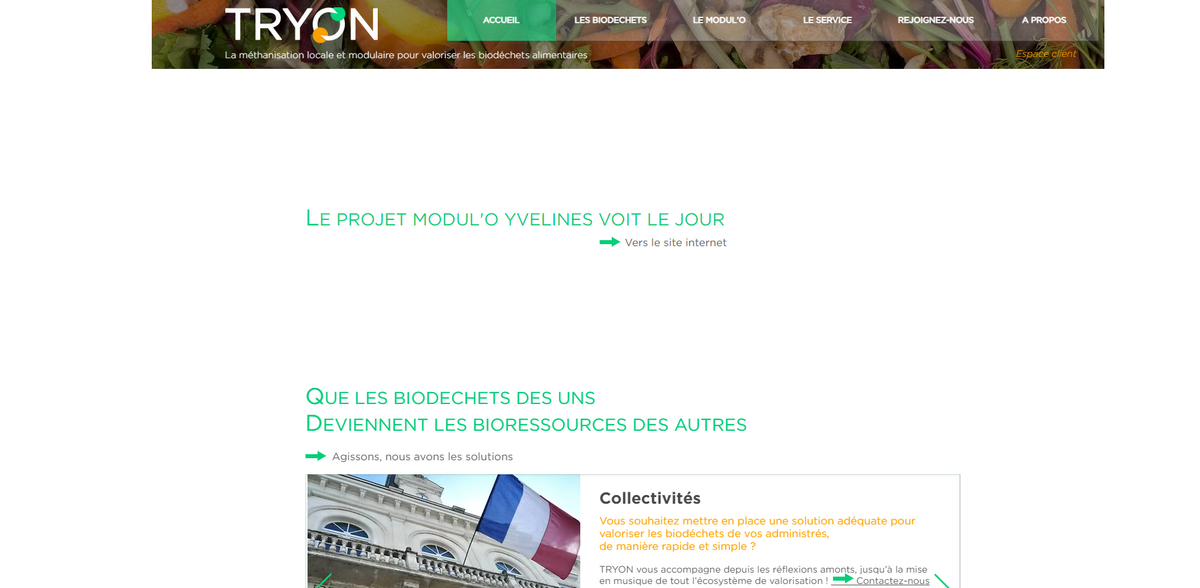What Is the Modul’O Yvelines Project?
LOCAL AND MODULAR METHANIZATION TO RECYCLE FOOD BIODÉCHETS – an innovative, turnkey solution taking on the challenge of reusing organic waste into valuable resources. The Modul’O Yvelines project is currently being launched with an ambitious and sustainable objective. It transforms biowastes into biogas, a renewable energy source, clear water, and organic fertilizer at a local scale. This project highlights the potential of recycling food biodéchets into bio-resources, making use of small, standard, modular, and automated anaerobic digesters. And yes, the solution is completely turnkey, offering full service including supervision, assistance, and maintenance – making implementation smooth and efficient.
Main Benefits and Key Figures
Along with cutting-edge technology, the project delivers impressive benefits and addresses critical issues through a series of important facts:
- 80% of water in biodéchets makes them a material that decomposes quickly, ultimately serving as a formidable energy and agronomic bio-resource.
- Each year, France produces about 10 million tons of biodéchets, representing more than one-third of total waste.
- Supermarkets generate between 20 to 200 tons/year of biodéchets, restaurants produce 5 to 50 tons/year, and individuals add around 5 to 50 kg/year per person.
- Over 80% of these biodéchets are destroyed due to the insufficient treatment capacity, despite established laws and rising environmental awareness.
From Organic Waste to Valuable Resource
Biodéchets, comprising food preparation scraps, fruit and vegetable peels, meal leftovers, and expired food products, are organic, non-hazardous, and biodegradable wastes. Even though the nature of these materials offers a huge potential to be transformed into valuable bio-resources, most of them are sadly destroyed, primarily because of a lack of local treatment capacities… This often occurs even though regulations and environmental consciousness demand rapid establishment of recycling systems across all territories. Tryon is known to assist from initial reflections through to the complete development of efficient recycling ecosystems.
Ensuring Compliance and Meeting Regulations
Regulatory frameworks impose clear obligations on producers who handle biodéchets. Every establishment must implement proper sorting at the production site, engage in selective collection, and ensure organic recycling via methods like methanization or composting. Notably, non-compliance can lead to severe consequences including a €75,000 fine, up to 2 years in prison, and 3 years of formal notice. The regulations cover a range of actors: since 2016, producers generating more than 10 tons per year must adhere, and by 2023, municipalities are required to generalize collection for all stakeholders, even including individuals. These strict measures highlight the critical nature of the environmental challenge.
Addressing the Treatment Capacity Challenge
One of the major obstacles to successful recycling is the insufficient treatment capacity in France. This deficiency often forces long-distance transportation of biodéchets, where high logistical costs significantly increase management expenses. Such challenges create a bottleneck that the Modul’O Yvelines project actively aims to resolve by localizing the recycling process. By evolving to a more structured and efficient approach, these modular anaerobic digesters help circumvent the logistical hurdles and open the door to cost-effective and sustainable organic waste processing.
Project Impact on Sustainability
- Sustainable Cities and Communities (SDG 11)
- Affordable and Clean Energy (SDG 7)
- Responsible Consumption and Production (SDG 12)
- Climate Action (SDG 13)
- Life on Land (SDG 15)
Turnkey Local and Modular Solution for a Greener Future
Turnkey solutions to transform biowastes into energy, water, and fertilizer at a local scale are at the heart of this project – presenting a fresh look at recycling that is both engaging and effective. The modular, automated anaerobic digesters are designed for ease-of-use and quick deployment, ensuring that even smaller stakeholders can participate in this critical environmental shift. With a full-service approach that covers supervision, assistance, and maintenance, this solution truly embodies the shift towards a sustainable, circular economy. The project turns organic waste into a renewable, valuable resource, demonstrating that what once was discarded can become a cornerstone of local energy production and agricultural support. Such initiatives are paving the way for a future where biodéchets no longer represent a waste problem, but instead become the bioresources of tomorrow.


















